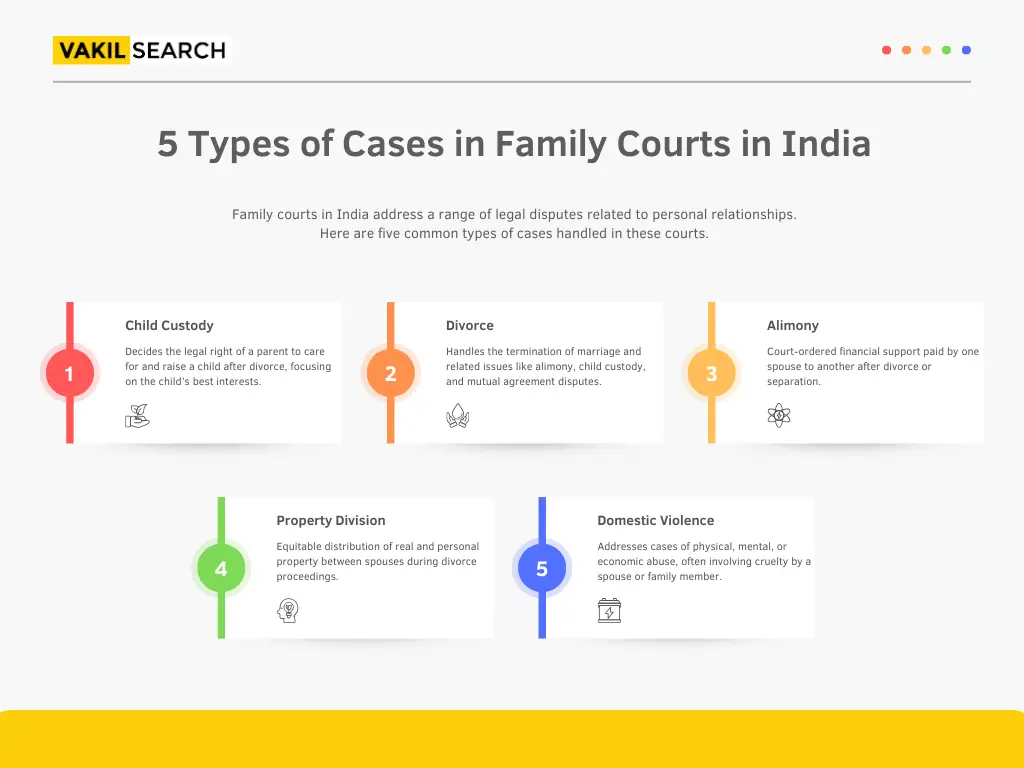The Indian legal system offers a wide range of options for resolving family disputes. One of the most popular methods for resolving family disputes is through the use of family courts. The article talks about types of cases in family courts in India.
Introduction: Family Court
It is a court of law that deals with family matters. ‘Family court’ can refer to a variety of different courts, including:
- Juvenile courts
- Domestic relations courts
- Adoption courts
- Probate courts
Each type of family court handles different types of cases. For example, juvenile courts typically deal with minor issues, while probate courts deal with wills and estates.
Types of Court
In India, there are four types of family courts:
- District Courts: The district court: https://districts.ecourts.gov.in/ is the lowest level of India’s four types of family courts. District courts handle matters such as divorce, child custody, and dowry disputes.
- City Civil Courts: City civil courts are similar to district courts, but they are located in larger cities. City civil courts typically have a more significant caseload than district courts. They may be better equipped to handle more complex cases.
- High Courts: High courts are the next level up from district and city civil courts. High courts have jurisdiction over matters such as adoption, alimony, and child support.
- Subordinate Court: Lastly, every court is a subordinate court of someone, but not the Supreme Court. A high court is a subordinate court of a supreme court, and a district and session court are subordinate courts of a high court. However, in the conceptual sense, a subordinate court refers to the village courts of India, known as Lok Adalat or Nyay Adalat, which offers justice to villagers. Villagers may not always travel to the nearby district city from their villages. As a part of the judicial system, this system was started by Madras Village Courts Act 1888 for resolving disputes at a micro level.
Types of Cases in Family Courts in India
India’s family courts can hear a wide variety of cases. Here are a few examples:
- Child custody: It is the legal right to keep and look after a child, especially the right given to a parent after a divorce. In these types of cases, the court will consider the child’s best interests.
- Divorce: The divorce cases in India may be filed if one spouse believes that the marriage has broken down. These are some of the most common types of cases in family courts in India. While the process of getting a divorce can be fairly straightforward, the aftermath often requires legal assistance. If you and your spouse are unable to come to an Alimony on matters related to your divorce, you may need to go to court to have a judge make a decision. The court will consider various factors when deciding on this type of case, such as the parties’ conduct during the marriage and the financial circumstances of each spouse.
- Alimony: Alimony, also known as spousal support, may be ordered by the court in some cases. This type of support is typically paid from one spouse to another after a divorce or legal separation. Consulting with legal experts can help you understand your rights and obligations regarding alimony. If you need personalized advice, consider using online lawyer consultation to get expert guidance tailored to your situation.
- Property division: In some cases, the court may need to divide property between spouses who are divorcing or separating. This includes real property (such as homes and land) and personal property (furniture and vehicles).
- Domestic violence: Domestic violence cases may be heard in family court. These cases often involve women facing cruelty at home by their husbands or families, either physically or mentally at times economically.

The Type and Nature of Cases Heard By the Family Court
The Indian family court hears a wide variety of cases, ranging from divorce and child custody to alimony and domestic violence. The family court may also be called upon to hear cases involving adoption or guardianship in some instances. While the majority of cases heard by the family court are civil in nature, there are also a small number of criminal cases that fall under its jurisdiction.
The family court has the power to issue a wide range of orders, including but not limited to ordering the payment of child support or alimony, awarding custody of children, and ordering the protection of victims of domestic violence.
In addition, the family court can also issue restraining orders against an individual who is deemed to be a threat to another family member.
How Long Does It Take to Prosecute a Case in a Family Court?
It can take anywhere from a few months to a few years to prosecute a case in a family court, depending on the severity of the case and the amount of evidence that needs to be gathered. In some cases, mediation may be able to help speed up the process.
Conclusion:-
There are a variety of cases that come before Indian family courts, ranging from divorce and child custody disputes to dowry harassment and domestic violence cases. It is true that the process of going through these courts can be challenging, but in resolving these types of issues, these courts serve an important function.
For instance, suppose you are involved in a family court case. It is vital to seek legal counsel in such a case to ensure that your rights are protected throughout the entire process. Make your doubts disappear, and be stress-free with your queries with Vakilsearch. Our family law experts can assist you.




